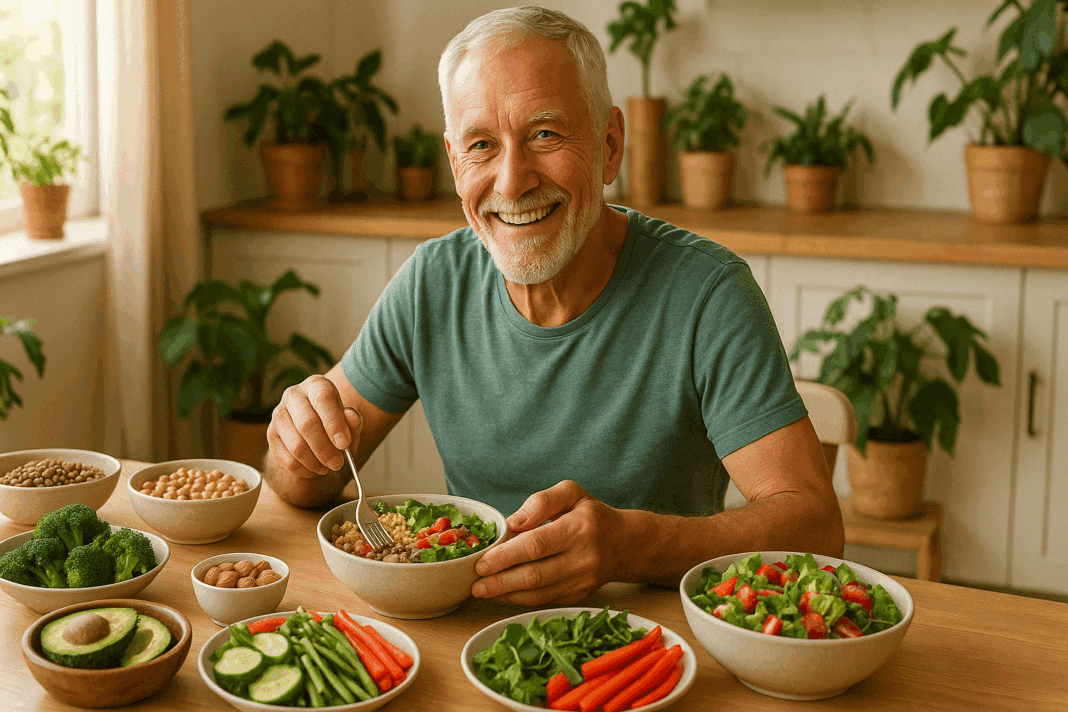As men enter their senior years, their nutritional needs shift in ways that call for thoughtful, strategic dietary choices. Maintaining muscle mass, preserving cognitive function, supporting heart health, and managing chronic conditions all become increasingly important. For those who have adopted a vegetarian lifestyle, embracing a veggie-heavy diet can serve as a powerful foundation for promoting longevity and enhancing overall quality of life. When thoughtfully constructed, a healthy diet for a vegetarian senior male can help ensure nutritional adequacy while leveraging the healing, anti-inflammatory, and disease-preventive properties of whole plant foods. This article explores science-backed plant-based eating habits that support vibrant aging in senior men, offering actionable guidance, research-based insights, and practical examples to empower dietary success.
You may also like: Plant Based Diet vs Standard American Diet: What the Latest Studies Reveal About Long-Term Health Outcomes
Understanding the Unique Nutritional Needs of Senior Vegetarian Men
Aging brings about physiological changes that alter how the body absorbs and utilizes nutrients. Muscle loss, known as sarcopenia, is a common concern among older adults, as is decreased bone density, diminished immune function, and changes in appetite or digestion. For a healthy diet for a vegetarian senior male, it is crucial to address these evolving needs with specific attention to protein intake, calcium, vitamin B12, vitamin D, omega-3 fatty acids, and iron. Unlike younger vegetarians who may be more resilient to occasional dietary gaps, older adults face higher stakes when it comes to maintaining nutritional adequacy.
Plant-based sources of protein such as lentils, tofu, tempeh, and quinoa can help meet protein needs, particularly when consumed consistently and in combination with physical activity to promote muscle maintenance. Calcium-rich plant foods such as kale, bok choy, fortified plant milks, and almonds contribute to bone health, though supplementation may be warranted for those with limited dietary intake. Since vitamin B12 is primarily found in animal products, senior vegetarians must rely on fortified foods or supplements to prevent deficiency-related fatigue, memory issues, and nerve damage. Integrating these targeted nutrients within a veggie-heavy diet enables older men to better support their physiological health as they age.
Why a Veggie-Heavy Diet Supports Longevity and Disease Prevention
Plant-based diets rich in vegetables, fruits, legumes, whole grains, nuts, and seeds have long been associated with a lower risk of chronic diseases such as heart disease, type 2 diabetes, and certain types of cancer. These benefits are particularly relevant for older adults, who face heightened risks for such conditions due to age-related physiological changes. A veggie-heavy diet, when properly composed, provides an abundance of fiber, phytonutrients, antioxidants, and healthy fats that help reduce systemic inflammation, stabilize blood sugar levels, lower cholesterol, and support vascular function.
For a healthy diet for a vegetarian senior male, the emphasis on whole, minimally processed plant foods helps mitigate the harmful effects of oxidative stress, which contributes to cellular aging and the progression of age-related diseases. Furthermore, vegetables like leafy greens, cruciferous vegetables, and colorful bell peppers deliver vital micronutrients that enhance immune function and promote healthy digestion. By centering meals around these nutrient-dense foods, senior men can enhance both their short-term well-being and long-term health outcomes.
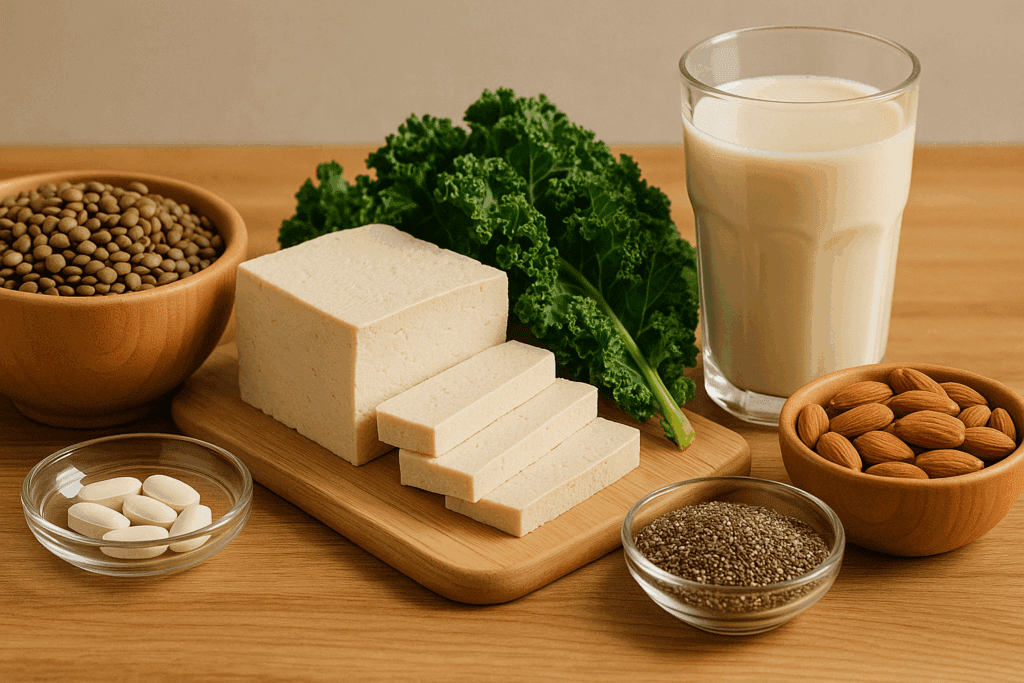
Prioritizing Protein-Rich Plant Foods to Maintain Muscle Mass
Sarcopenia, or age-related muscle loss, affects many older adults and can lead to frailty, decreased mobility, and a higher risk of falls. Adequate protein intake becomes increasingly important with age, and for vegetarian senior men, sourcing high-quality plant-based protein requires careful planning. Fortunately, a wide array of plant foods provide essential amino acids and can support lean muscle preservation when consumed in sufficient amounts.
Legumes such as black beans, chickpeas, and lentils are foundational components of a veggie-heavy diet and serve as excellent protein sources. Tofu and tempeh not only offer complete protein profiles but are also versatile and easy to incorporate into savory dishes. Quinoa and buckwheat further diversify the protein landscape, providing additional options for those looking to vary their diet. By combining different plant proteins throughout the day, senior vegetarians can achieve optimal amino acid intake while benefiting from the added fiber, iron, and magnesium these foods deliver. Consistently prioritizing protein-rich choices empowers aging men to preserve strength, remain active, and support their metabolic health.
Supporting Bone Health Through Whole Plant Nutrition
Bone density naturally declines with age, making older adults—particularly men over 65—more susceptible to fractures and osteoporosis. While dairy is a traditional source of calcium, plant-based eaters can support strong bones through a combination of nutrient-rich foods and strategic supplementation. For a healthy diet for a vegetarian senior male, incorporating calcium-fortified plant milks, leafy greens like collard greens and kale, and calcium-set tofu provides a solid foundation for meeting calcium needs.
Equally important is vitamin D, which enhances calcium absorption and bone mineralization. Sunlight exposure is one natural source, but older adults often require supplemental vitamin D due to reduced skin synthesis. Additionally, magnesium and vitamin K—found abundantly in vegetables such as spinach, Swiss chard, and Brussels sprouts—play vital roles in bone metabolism. A veggie-heavy diet, when designed with these nutrients in mind, can offer robust protection against age-related bone deterioration. By combining intentional food choices with appropriate supplementation, senior vegetarians can safeguard their skeletal health and maintain mobility well into older age.
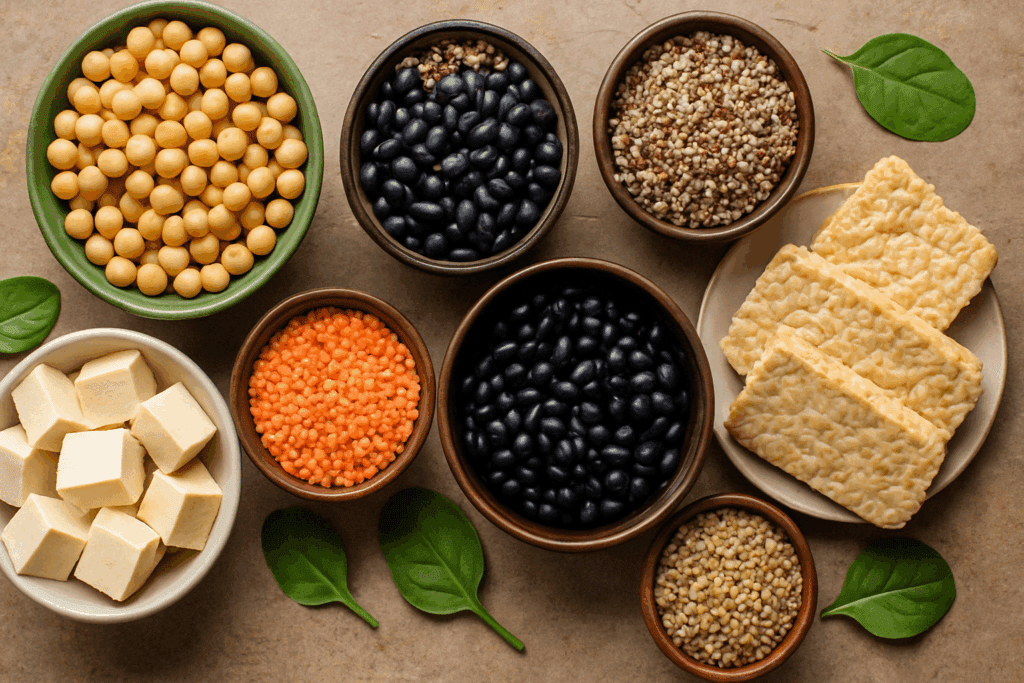
Managing Heart Health with a Plant-Based Lifestyle
Cardiovascular disease remains the leading cause of death among older men, but the good news is that diet plays a pivotal role in prevention and management. A veggie-heavy diet rich in whole plant foods can help reduce blood pressure, lower LDL cholesterol, and improve arterial function. The fiber found in oats, legumes, and vegetables binds to cholesterol in the digestive tract, preventing its absorption and facilitating its excretion. Moreover, nuts and seeds such as walnuts and flaxseeds provide heart-healthy omega-3 fatty acids, which have been shown to reduce inflammation and support endothelial health.
Senior vegetarians who emphasize leafy greens, berries, avocados, and whole grains can further enhance their cardiovascular profile. These foods contain flavonoids, nitrates, and potassium, all of which contribute to improved blood flow and reduced hypertension. A healthy diet for a vegetarian senior male should also minimize intake of processed vegetarian foods high in sodium, added sugars, and trans fats, as these can negate the benefits of otherwise nutritious meals. When combined with regular physical activity, mindful eating patterns rooted in plant-based principles offer a powerful defense against cardiovascular decline.
Promoting Cognitive Function Through Antioxidant-Rich Foods
As the brain ages, cognitive decline becomes a growing concern. However, mounting research suggests that diet can influence brain health and reduce the risk of conditions like dementia and Alzheimer’s disease. A veggie-heavy diet, particularly one focused on antioxidant-rich and anti-inflammatory foods, supports cognitive vitality and slows neurodegenerative processes. Berries, dark leafy greens, cruciferous vegetables, and legumes are rich in polyphenols and flavonoids that combat oxidative stress and enhance neuronal communication.
Omega-3 fatty acids, particularly DHA, are critical for brain function, yet they are typically derived from fish. Senior vegetarians can meet their needs through algae-based DHA supplements, flaxseed, chia seeds, and walnuts. In addition, foods like turmeric, pumpkin seeds, and cocoa contain neuroprotective compounds that have been linked to improved memory and attention. A healthy diet for a vegetarian senior male should prioritize these functional foods to nourish the brain and foster mental clarity. When paired with adequate sleep, hydration, and mental stimulation, diet becomes a cornerstone of cognitive resilience in later life.
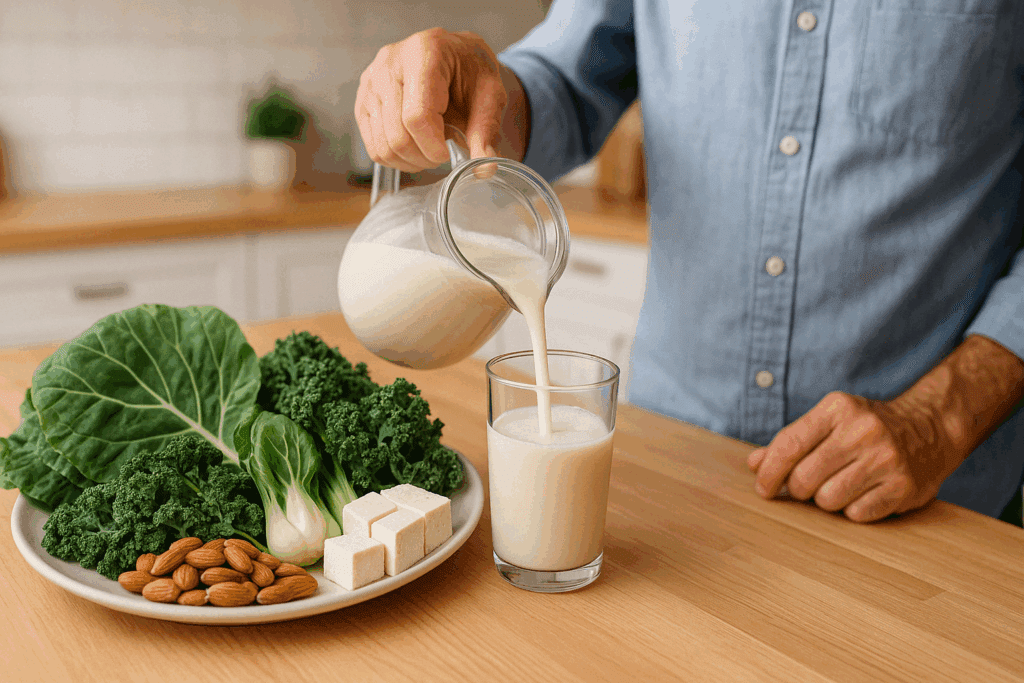
Supporting Digestive Health and Gut Microbiome Balance
The aging digestive system often experiences a decline in motility, enzyme production, and microbial diversity, all of which can impact nutrient absorption and bowel regularity. Fortunately, a veggie-heavy diet naturally supplies the fiber and prebiotics needed to support a thriving gut microbiome. Whole grains, legumes, fruits, and vegetables feed beneficial bacteria in the colon, promoting the production of short-chain fatty acids that protect gut lining integrity and reduce inflammation.
For a healthy diet for a vegetarian senior male, focusing on diversity in plant food intake is key to cultivating a robust microbial ecosystem. Fermented foods such as sauerkraut, kimchi, and miso introduce live probiotics that further enhance gut health and improve digestion. Additionally, drinking plenty of water and staying physically active help maintain bowel regularity and support gastrointestinal function. By aligning dietary habits with gut-friendly principles, senior vegetarians can alleviate common digestive complaints and optimize nutrient absorption.
Maintaining Healthy Weight and Metabolism with Whole Plant Foods
Weight management can become more challenging with age due to metabolic slowing, hormonal changes, and reduced physical activity. However, a veggie-heavy diet provides a unique advantage for older adults seeking to maintain a healthy weight. Plant foods tend to be lower in energy density while offering high satiety due to their fiber and water content. This allows senior vegetarians to consume satisfying portions without overloading on calories.
Beans, vegetables, fruits, and whole grains not only nourish the body but also help regulate appetite hormones and insulin sensitivity. For a healthy diet for a vegetarian senior male, choosing minimally processed foods and avoiding refined carbohydrates or sugar-laden snacks is crucial for weight maintenance and metabolic balance. Incorporating regular movement, such as walking, resistance training, or yoga, further complements these dietary efforts. Together, these strategies help preserve muscle mass, enhance energy levels, and support long-term wellness.
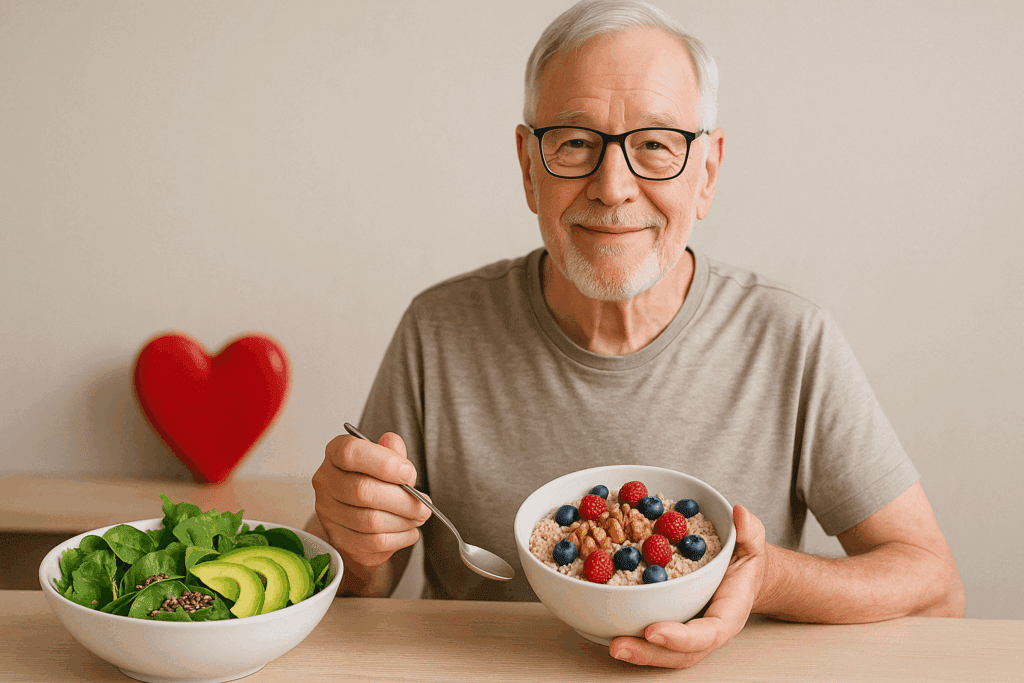
Navigating Nutritional Supplementation in the Senior Years
While a well-planned plant-based diet can meet most nutritional needs, certain nutrients may require supplementation in older adults due to reduced absorption or dietary limitations. Vitamin B12, as previously mentioned, is essential for nerve function and red blood cell production but must be obtained through fortified foods or supplements. Similarly, vitamin D is often insufficient due to limited sun exposure and may necessitate daily supplementation, especially in northern climates or during winter months.
Iron needs tend to decrease with age, yet senior vegetarians should remain vigilant about iron-rich plant foods and consider periodic blood work to assess status. Omega-3s in the form of algae-based DHA and EPA supplements are also advisable for cognitive and cardiovascular protection. A healthy diet for a vegetarian senior male may also benefit from zinc, iodine, and calcium supplementation depending on individual dietary patterns and health conditions. Consulting a healthcare provider or registered dietitian can help tailor supplementation strategies to ensure optimal nutrient balance.
Practical Tips for Building Balanced, Satisfying Meals
Creating nutrient-rich, delicious meals on a plant-based diet is entirely achievable with thoughtful planning and variety. A veggie-heavy diet offers the perfect canvas for colorful, flavorful, and satisfying dishes that support aging well. Start by building meals around a core of legumes, whole grains, and vegetables, layering in healthy fats from nuts, seeds, and avocados. Incorporate herbs, spices, and fermented foods to enhance flavor and promote digestion.
Batch cooking soups, stews, and grain bowls can save time and ensure nutrient density throughout the week. Rotating seasonal produce helps maximize freshness, affordability, and nutrient diversity. A healthy diet for a vegetarian senior male should also include regular hydration, mindful eating practices, and occasional indulgences to promote long-term dietary satisfaction and sustainability. Ultimately, embracing flexibility and creativity in the kitchen can make plant-based living both nourishing and enjoyable.
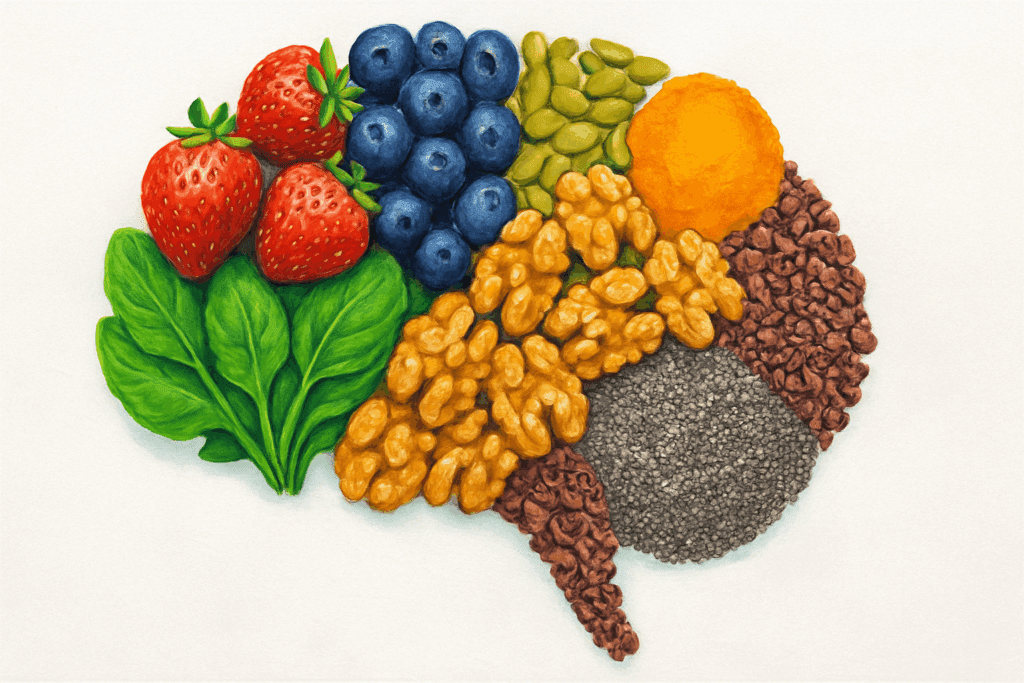
Frequently Asked Questions: Best Plant-Based Eating Habits for Senior Vegetarian Men
1. How can a veggie-heavy diet improve mental well-being in senior vegetarian men beyond cognitive function?
While the cognitive benefits of plant-based eating are increasingly documented, the psychological effects of a veggie-heavy diet also deserve attention. Studies suggest that diets rich in fruits, vegetables, and legumes are associated with lower rates of depression and anxiety. This may be due in part to the anti-inflammatory properties of plant foods, which influence mood-regulating neurotransmitters such as serotonin. For a healthy diet for a vegetarian senior male, the social aspect of shared cooking and mealtimes with plant-based dishes can also foster stronger emotional connections and combat isolation. Incorporating vibrant, colorful meals may additionally improve appetite and engagement with food, which supports overall psychological resilience.
2. Are there cultural or social benefits to following a veggie-heavy diet in older age?
Yes, many senior vegetarians report increased social interaction and a sense of purpose when participating in plant-based communities or cooking groups. A veggie-heavy diet often involves more food preparation and creativity, which can inspire seniors to try new cultural cuisines and engage in community potlucks or classes. For a healthy diet for a vegetarian senior male, these interactions may also reinforce dietary adherence and reduce the risk of loneliness. In some cultures, plant-based eating is deeply connected to traditional values and philosophies, giving older adults an opportunity to reconnect with heritage. This cultural alignment can enhance mental well-being and identity during the aging process.
3. How can senior vegetarian men ensure they’re meeting their hydration needs on a veggie-heavy diet?
Hydration is often overlooked but plays a vital role in nutrient absorption and cognitive clarity in older adults. Many vegetables, such as cucumbers, zucchini, and lettuce, have high water content and contribute to daily fluid intake. Still, for a healthy diet for a vegetarian senior male, relying solely on food-based hydration isn’t enough. Seniors should aim to drink fluids consistently throughout the day, ideally infused with herbs, citrus, or berries for variety. Monitoring urine color and energy levels can help gauge hydration status, especially since thirst mechanisms become less reliable with age.
4. Is it possible to follow a veggie-heavy diet on a fixed income or limited budget?
Absolutely, and in fact, a well-planned plant-based diet can be more economical than one centered on animal products. Staples like lentils, rice, oats, canned beans, and seasonal vegetables are both affordable and versatile. Shopping at farmers’ markets late in the day, buying in bulk, and meal planning around weekly sales can help reduce costs. For a healthy diet for a vegetarian senior male, batch cooking and freezing meals can minimize food waste while ensuring convenient, nutritious options are always available. Nutrition assistance programs and local co-ops may also offer discounts to seniors committed to healthy eating.
5. What are some emerging plant-based innovations that benefit older vegetarians?
The plant-based food industry is rapidly expanding, with innovations tailored to various dietary needs. For example, plant-based yogurts fortified with calcium and probiotics can support bone and gut health simultaneously. New meat alternatives derived from fungi or pea protein offer high-quality protein with lower sodium than earlier generations of faux meats. For a healthy diet for a vegetarian senior male, such innovations make it easier to meet nutritional goals without sacrificing taste or convenience. Advances in personalized nutrition apps and wearable tech can also help seniors track dietary intake and flag potential nutrient gaps more effectively.
6. How can senior men overcome reduced appetite when following a veggie-heavy diet?
Appetite tends to decline with age, but strategic choices can help maintain adequate intake. Incorporating warming spices such as ginger, turmeric, and cumin can stimulate digestion and enhance flavor perception. Small, nutrient-dense meals spaced throughout the day can also be more manageable than large portions. Smoothies made with greens, nut butters, and plant-based protein powders can serve as convenient options when chewing or preparing food becomes challenging. Maintaining a healthy diet for a vegetarian senior male may also involve creating a visually appealing plate, as vibrant colors and varied textures can reignite interest in eating.
7. What are the long-term implications of staying on a plant-based diet into late adulthood?
Long-term adherence to a plant-based lifestyle has been associated with lower risk of chronic diseases, better weight control, and improved quality of life metrics. However, it’s important that this lifestyle remains adaptive and responsive to changing nutritional needs. For a healthy diet for a vegetarian senior male, regular check-ins with a registered dietitian or healthcare provider can help fine-tune dietary intake over time. The long-term mental and emotional satisfaction of eating in alignment with personal ethics or environmental values may also promote well-being in older adults. Aging with vitality on a veggie-heavy diet is not only possible but increasingly supported by long-range cohort studies and population health data.
8. Are there seasonal strategies that help maintain a veggie-heavy diet year-round?
Seasonal eating provides both nutritional and psychological benefits. In the winter, hearty root vegetables, legumes, and whole grains can provide comfort and sustenance, while in summer, hydrating fruits and raw salads become more appealing. Canning, freezing, and dehydrating seasonal produce allows for variety even when fresh options are limited. For a healthy diet for a vegetarian senior male, planning meals around the harvest calendar ensures optimal freshness and affordability. Seasonal shifts can also help renew interest in cooking, preventing dietary fatigue and encouraging the exploration of new recipes.
9. Can a veggie-heavy diet support immune health in senior vegetarians?
Yes, and this is especially important as immune function tends to decline with age. A veggie-heavy diet offers an abundance of immune-supportive nutrients such as vitamin C, zinc, beta-carotene, and plant polyphenols. Fermented foods like tempeh and miso introduce beneficial microbes that further support immune resilience through gut health. For a healthy diet for a vegetarian senior male, focusing on variety—especially across different colors and types of produce—ensures a broad spectrum of protective compounds. Managing stress, maintaining good sleep hygiene, and limiting ultra-processed foods further complement the immune-supportive role of a plant-based lifestyle.
10. How can senior vegetarian men incorporate more culinary creativity into their plant-based meals?
Culinary creativity keeps meals exciting and promotes long-term adherence to healthy eating. Trying global plant-based cuisines—such as Ethiopian lentil stews, Japanese soba noodles, or Indian dals—can introduce new flavor profiles and nutrients. For a healthy diet for a vegetarian senior male, investing in a few simple kitchen tools like a pressure cooker or blender can dramatically expand culinary options. Watching cooking shows, joining virtual cooking classes, or swapping recipes with friends can also spark inspiration. Ultimately, embracing a veggie-heavy diet becomes more sustainable when it’s seen not just as a routine, but as an evolving culinary adventure.
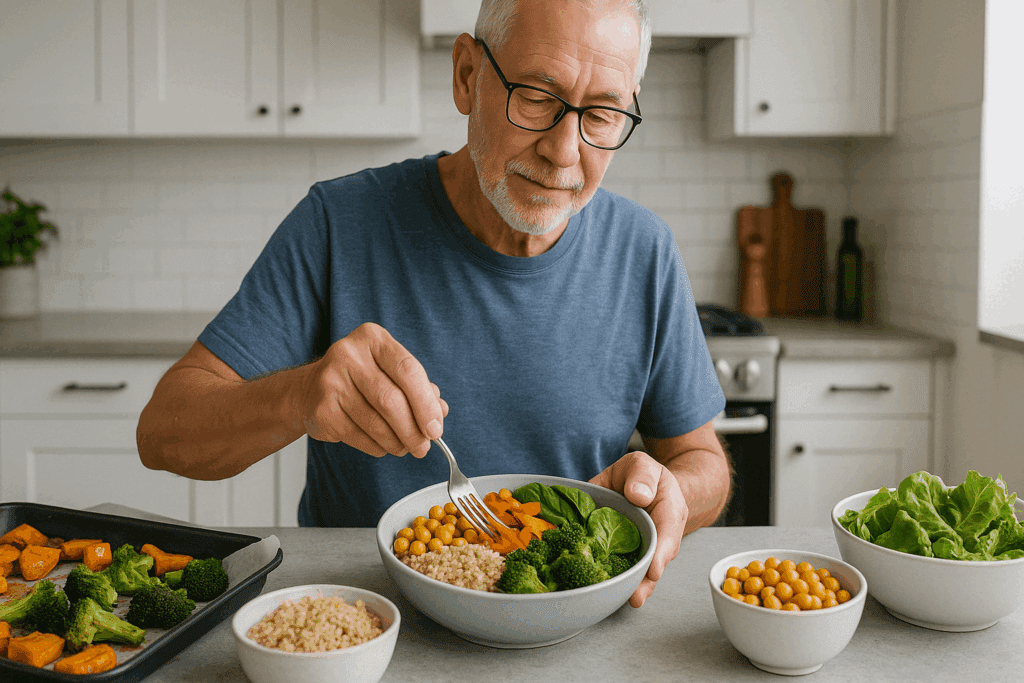
Conclusion: Embracing a Veggie-Heavy Diet for Lifelong Vitality in Senior Vegetarian Men
Adopting and maintaining a healthy diet for a vegetarian senior male goes beyond simply avoiding meat—it involves actively choosing whole, plant-based foods that nourish the body, support age-specific nutritional needs, and enhance overall well-being. A veggie-heavy diet, when thoughtfully planned, can help older men maintain muscle strength, protect cognitive function, support heart and bone health, and preserve digestive balance. The combination of diverse plant-based nutrients, intentional supplementation, and balanced meals offers a sustainable path to aging with strength, clarity, and vitality.
Incorporating the principles outlined in this article empowers senior vegetarian men to align their eating habits with the latest in nutritional science while honoring personal values and preferences. By embracing a diet rich in vegetables, legumes, whole grains, nuts, and seeds, aging adults can enjoy not only longevity but also a higher quality of life. Aging well is not just about adding years to life, but life to years—and there is perhaps no better foundation for that pursuit than a vibrant, veggie-heavy diet tailored to the unique needs of senior men.
Was this article helpful? Don’t let it stop with you. Share it right now with someone who needs to see it—whether it’s a friend, a colleague, or your whole network. And if staying ahead on this topic matters to you, subscribe to this publication for the most up-to-date information. You’ll get the latest insights delivered straight to you—no searching, no missing out.
Further Reading:
Want to try vegan? Not sure where to start?
Healthy Meal Planning: Tips for Older Adults
Vegetarian diet: How to get the best nutrition
Disclaimer
The information contained in this article is provided for general informational purposes only and is not intended to serve as medical, legal, or professional advice. While NewsHealthWatch strives to present accurate, up-to-date, and reliable content, no warranty or guarantee, expressed or implied, is made regarding the completeness, accuracy, or adequacy of the information provided. Readers are strongly advised to seek the guidance of a qualified healthcare provider or other relevant professionals before acting on any information contained in this article. NewsHealthWatch, its authors, editors, and contributors expressly disclaim any liability for any damages, losses, or consequences arising directly or indirectly from the use, interpretation, or reliance on any information presented herein. The views and opinions expressed in this article are those of the author(s) and do not necessarily reflect the official policies or positions of NewsHealthWatch.

